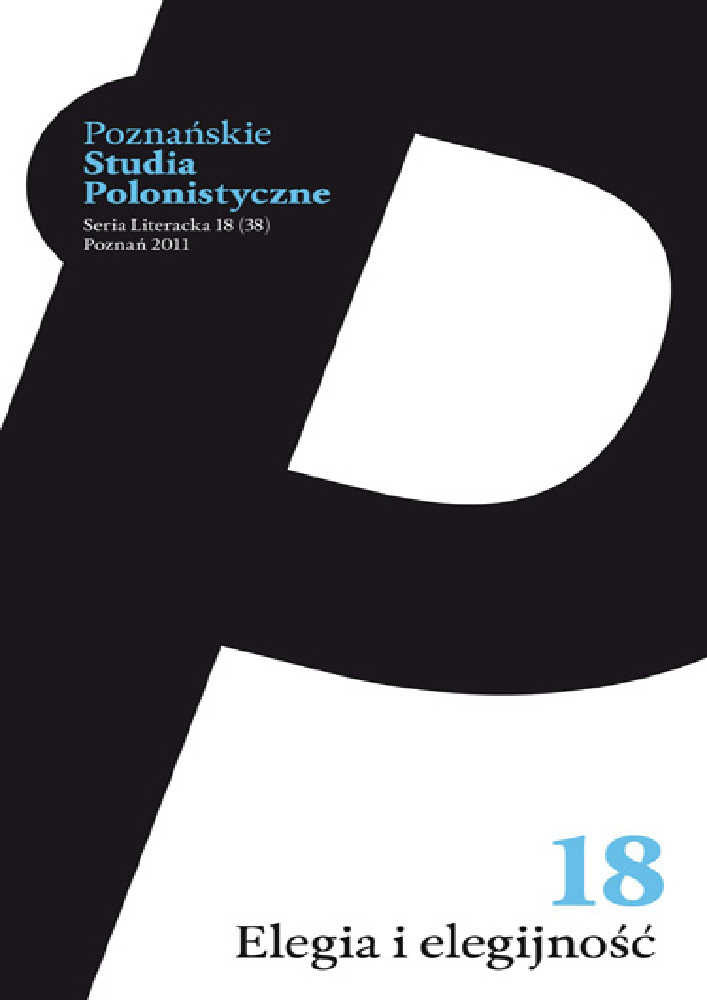Abstrakt
This article attempts to define the place of elegiac modality in the literary output of Victor Hugo. The starting point for the discussion and at the same time appropriate interpretative tool is the definition of elegy derived from the writings of German theoreticians of Romanticism: Friedrich Schiller and Friedrich Schlegel. The thing is question is the elegiac attitude based on exposing of what is ideal and lost at the same time. The above, indeed, constitutes an answer to the questions of the experience of crisis so inherent to Romanticism. Analyses of the early poetical volumes written by the author show a particular evolution of Hugo’s conception of poetry. Politically committed The Odes, being anti-elegiac by assumption, are discussed, as well as purely poetical Eastern poems overtly promoting limitless freedom which characterizes the creative imagination. The interpretation of individual poems from these volumes proves, however, that one can discern a certain elegiac tone in them, though the tone is never dominant. The volume that distinctively enhances the elegy (thus far discredited by Hugo and from then on permanently occurring in his works) turns out to be Autumn Leaves — a collection of poems of contemplative, melancholic, visionary and self-reflective character.
Bibliografia
Albouy P., La création mythologique chez Victor Hugo, Paris 1968.
Barrère, Wiktor Hugo – człowiek i dzieło, przeł. J. Parvi, Warszawa 1968.
Barrère J.B., Ku szczytom kariery, w: Wiktor Hugo – człowiek i dzieło, przeł. J. Parvi, Warszawa 1968.
Bénichou P., Romanstismes français, t. 2: Les Mages romantiques, Paris 2004.
Bertrand J.P., Durand P., La modernité romantique de Lamartine à Nerval, Paris–Bruxelles
Bielik-Robson A., Inna nowoczesność. Pytania o współczesną formułę duchowości, Kraków 2000.
Bieńczyk M., Melancholia. O tych, co nigdy nie odnajdą straty, Warszawa 1998.
Charles-Wurtz L., Des „Odes et Ballades” aux „Orientales” – vers une libre circulation de la parole poétique, „La Revue des Lettres modernes” 2002, Victor Hugo, t. 5: Autour des „Orientales”, red. C. Millet.
Charles-Wurtz L., Poétique du sujet lyrique dans l’oevre de Victor Hugo, Paris 1998.
Decroix O., Logiques de l’expansion du discours dans l’oeuvre poétique avant l’exil, w: Victor Hugo et le langage, red. F. Naugrette, G. Rosa, Bréal 2005, s. 199–206.
Grzędzielska M., Elegia [hasło], w: Słownik literatury polskiej XIX wieku, red. J. Bachórz, A. Kowalczykowa, Wrocław 1994.
Hugo V., Oeuvres poétiques complètes, Paris 1961.
Hugo et l’Histoire, red. L.F. Hoffmann, S. Nash, Paris 2005.
Janion M., Gorączka romantyczna, w: Prace wybrane, red. M. Czermińska, t. 1, Kraków 2000, cz. 2: Romantyczne głębie i przestworza.
Janion M., Żmigrodzka M., Romantyzm i historia, Gdańsk 2001.
Legeżyńska A., Gest pożegnania. Szkice o poetyckiej świadomości elegijno-ironicznej, Poznań 1999.
Juden B., Traditions orphiques et tendances mystiques dans le romantisme français (1800–1855), Paris 1942, cz. 4, rozdz. 3.
Manifesty romantyzmu 1790–1830. Anglia, Niemcy, Francja, oprac. A. Kowalczykowa, Warszawa 1995.
Meschonnic H., Hugo – la poésie contre le maintien de l’ordre, Paris 2002.
Piotrowska H., Elegia, w: Słownik literatury polskiego oświecenia, red. T. Kostkiewiczowa, Wrocław 2002.
Millet C., L’Inspiration poétique des „Nouvelles Odes” aux „Orientales”, „La Revue des Lettres modernes” 2002,Victor Hugo, t. 5: Autour des „Orientales”, red. C. Millet.
Riffaterre M., Sémiosis hugolienne, w: Hugo le fabuleux, red. J. Seebacher, A. Ubersfeld, Paris 1985.
Schiller F., O poezji naiwnej i sentymentalnej, przeł. I. Krońska, w: Listy o estetycznym wychowaniu człowieka i inne rozprawy, Warszawa 1972.
Schlegel F., Fragmenty, przeł. C. Bartl, oprac. M.P. Markowski, Kraków 2009.
Siwiec M., „Kobiety, wiem to, pisać nie powinny/ A jednak piszę...”. Romantyczna poetka i jej muza, „Teksty Drugie” 2009, nr 3, s. 11–32.
Sławiński J., Elegia [hasło], w: Słownik terminów literackich, red. M. Głowiński et al., Wrocław 2002.
Szastyńska-Siemion A., Elegia i epigram. Kilka problemów terminologicznych, w: Elegia poprzez wieki. Konferencja naukowa 8–9 XI 1994, red. I. Lewandowski, Poznań 1995.
Śniedziewski P. Romantyczna świadomość elegijna – rozprawa „O elegii” Kazimierza Brodzińskiego, „Pamiętnik Literacki” 2011, z. 1.
Taylor Ch., Źródła podmiotowości. Narodziny tożsamości nowoczesnej, przekł. zbiorowy, oprac. T. Gadacz, Warszawa 2001.
Thibaudet A., Historia literatury francuskiej. Od Rewolucji Francuskiej do lat trzydziestych XX wieku, przeł. J. Guze, Warszawa 1997.
Urban-Godziek G., Elegia renesansowa. Przemiany gatunku w Polsce i w Europie, Kraków 2005.
Licencja
Autorzy
Autorzy tekstów przyjętych do publikacji w czasopiśmie „Poznańskie Studia Polonistyczne. Seria Literacka” są zobowiązani do wypełnienia, podpisania i odesłania na adres redakcji umowy o udzielenie nieodpłatnej licencji do utworów, z zobowiązaniem do udzielania sublicencji CC.
Zgodnie z umową, autorzy tekstów opublikowanych w czasopiśmie „Poznańskie Studia Polonistyczne. Seria Literacka” udzielają Uniwersytetowi im. Adama Mickiewicza w Poznaniu niewyłącznej i nieodpłatnej licencji oraz zezwalają na użycie sublicencji Creative Commons Attribution-NoDerivatives 4.0 International (CC BY-ND 4.0).
Autorzy zachowują prawa do dalszego, swobodnego rozporządzania utworem.
Użytkownicy
Zainteresowani użytkownicy internetu uprawnieni są do korzystania z utworów opublikowanych od 2016 roku w „Poznańskich Studiach Polonistycznych. Serii Literackiej” pod następującymi warunkami:
- uznanie autorstwa – obowiązek podania wraz z rozpowszechnionym utworem, informacji, o autorstwie, tytule, źródle (odnośniki do oryginalnego utworu, DOI) oraz samej licencji;
- bez tworzenia utworów zależnych – utwór musi być zachowany w oryginalnej postaci, nie można bez zgody twórcy rozpowszechniać np. tłumaczeń, opracowań.
Do wszystkich tekstów opublikowanych przed 2016 r. prawa autorskie są zastrzeżone.
Inne
Uniwersytet im. Adama Mickiewicza w Poznaniu zachowuje prawo do czasopisma jako całości (układ, forma graficzna, tytuł, projekt okładki, logo itp.).
